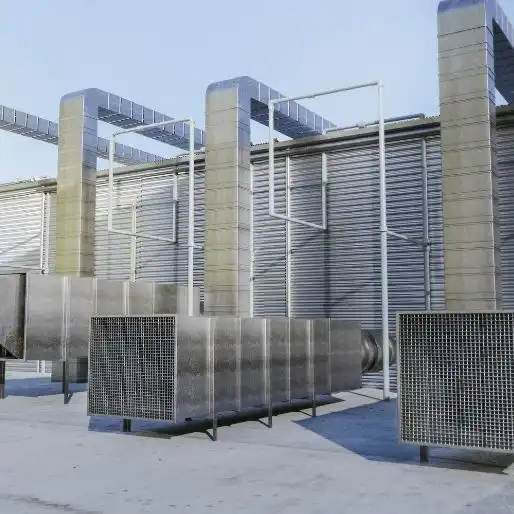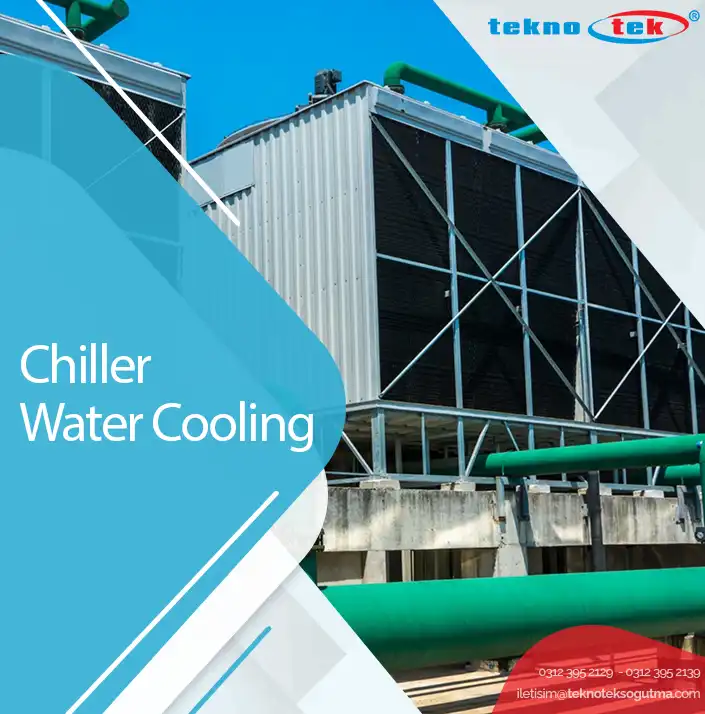Chiller water cooling systems are one of the central cooling solutions and have a wide range of applications from industrial facilities to office buildings. These systems ensure that water is cooled to a specific temperature. They play a critical role in areas such as air conditioning, process cooling, and increasing machine efficiency. The system is preferred in high-capacity enterprises to improve energy efficiency and maintain stable temperature control.
Chiller water cooling technologies are designed in different types. Depending on operational needs, models can be applied as air-cooled or water-cooled systems. Air-cooled systems are generally suitable for smaller-scale applications or outdoor use. On the other hand, water-cooled chillers stand out in larger facilities where higher cooling capacity is required. These systems are also developed to optimize energy consumption.
The application areas of chiller water cooling systems are as follows:
- Industrial facilities: Used for process cooling in plastic injection, metal processing, chemical, and pharmaceutical industries.
- Shopping malls and large buildings: Provide cooling for wide spaces in central air-conditioning systems.
- Hospitals and laboratories: Preferred for maintaining stable temperatures of medical devices and laboratory equipment.
- Hotels and residential projects: Integrated into central cooling systems to ensure a comfortable indoor climate.
- Food and beverage industry: Used for temperature control and product preservation during production.
- Data centers: Crucial for keeping server rooms cool and ensuring uninterrupted operation.
- Power plants: Employed for cooling turbines, generators, and other equipment.

Chiller Water Cooling Prices
Chiller water cooling devices are among the effective cooling systems commonly chosen for large-scale enterprises and industrial areas. These systems are used in high-capacity production facilities, shopping centers, hotels, or hospitals. By maintaining heat balance, they provide energy efficiency.
Several factors influence the pricing of water cooling systems. The device’s capacity, technological features, material quality, and brand all play a direct role in cost. Additionally, systems tailored to meet the specific needs of a business may be offered at different price ranges.
Chiller devices are designed in different types to meet diverse needs. The most common among these are air-cooled and water-cooled models.
Air-cooled systems are more suitable for outdoor applications. Their installation is simpler, and their cost is comparatively lower. In contrast, water cooling systems are often preferred in large industrial facilities requiring high capacity. This distinction plays a significant role in price variations. Furthermore, the device’s energy efficiency, long-term maintenance costs, and savings it provides to the enterprise are factors to be considered.
Since these devices are designed to meet cold air requirements, evaluating prices based on a single criterion is not an accurate approach. Factors such as capacity selection, technology, and application area significantly influence costs.
Taking all these factors into account, it is necessary to compare different models in terms of both installation and operating costs. This ensures a more efficient and economical investment in the long term.
Advantages of Chiller Water Cooling Systems
The use of chiller water cooling systems is preferred in various industries, and the main reason lies in their many advantages.
Primarily, these systems provide high efficiency and stable temperature control across wide areas. In industrial facilities, they prevent machines from overheating, while in living spaces, they create a comfortable environment. By optimizing energy use, these systems lead to significant long-term savings for businesses. Additionally, since they are manufactured with durable equipment, it is possible to ensure a long service life with regular maintenance.
Another advantage is the reliability of stable temperature control. By preventing temperature fluctuations in production processes, these systems play an important role in quality and efficiency.
Modern chiller devices are produced with environmentally friendly refrigerants, minimizing environmental impacts. This contributes to businesses achieving their sustainability goals.
Available in both air-cooled and water-cooled versions, these systems offer flexible solutions depending on capacity and operational needs. With all these features, chiller water cooling systems are both an economical and functional option in the long run.
For more detailed information about chiller water cooling systems, you can contact Teknotek.

